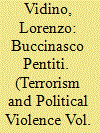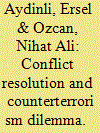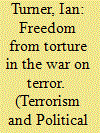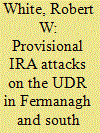| Srl | Item |
| 1 |
ID:
105991


|
|
|
|
|
| Publication |
2011.
|
| Summary/Abstract |
Recently many scholars have focused their attention on the dynamics of radicalization, de-radicalization, and disengagement, yet most studies are based on indirect and/or data which is difficult to verify. An exception comes from Italy, where authorities have recently benefited from the insights of two former members of an al Qaeda-affiliated Tunisian network. The two have voluntarily described to authorities the process and factors that led them to their radicalization and encouraged them to abondon the network. Based on thousands of pages of their unpublished confessions, the article provides a case study of radicalization that is rich in detail and uniquely reliable.
|
|
|
|
|
|
|
|
|
|
|
|
|
|
|
|
| 2 |
ID:
105993


|
|
|
|
|
| Publication |
2011.
|
| Summary/Abstract |
This article considers the relationship between two processes-conflict resolution and counterterrorism-which conceptually share many common points, yet in practice do not necessarily proceed together easily towards a common goal. Considering particular cases of ethnic conflict in which terrorist factions exist, the article argues that while neither conflict resolution nor counterterrorism alone can adequately address the problem, simultaneously conducting both must keep in mind the processes' inherent differences and avoid excessive prioritizing of one over the other. By exploring recent Turkish governmental initiatives to address the Kurdish question, the article attempts to provide an outline for how to successfully cope with the two processes simultaneously.
|
|
|
|
|
|
|
|
|
|
|
|
|
|
|
|
| 3 |
ID:
105992


|
|
|
|
|
| Publication |
2011.
|
| Summary/Abstract |
Freedom from torture is regarded as "absolute," meaning that a state cannot infringe the right for purposes which would seem legitimate such as the protection of national security. Indeed, the freedom is viewed as "non-derogable"; that is, infringements are not permitted even in special circumstances such as times of war or public emergency. Is it right, however, with the growth in international terrorism post-9/11, particularly suicide violence, that the freedom should remain without limitation? Perhaps the torture of terror suspects might provide state authorities with intelligence so that acts of atrocity can be averted? To go on and construct a possible argument justifying ill-treatment against a detainee this article questions whether in fact freedom from torture can be categorised as absolute.
|
|
|
|
|
|
|
|
|
|
|
|
|
|
|
|
| 4 |
ID:
105990


|
|
|
|
|
| Publication |
2011.
|
| Summary/Abstract |
This article analyzes the global transformations of jihadist movements towards abandoning and de-legitimizing political violence in general and terrorism in particular. It focuses on the de-radicalization process of Libya's largest armed Islamist movement: the Islamic Fighting Group. It analyzes the causes behind those transformations and outlines the necessary conditions for, and policy implications of, successful de-radicalization. The article is mainly based on primary sources, field work, and interviews with former jihadist leaders, mid-ranking commanders, grassroots activists, security and intelligence officers, and state officials.
|
|
|
|
|
|
|
|
|
|
|
|
|
|
|
|
| 5 |
ID:
105987


|
|
|
|
|
| Publication |
2011.
|
| Summary/Abstract |
This article continues a discussion begun in the 1990s on the degree to which Provisional Irish Republican Army activities were sectarian. Henry Patterson's recent contribution raises issues that concern not only interpretations of the Irish conflict but also have implications for the more general study of the causes and consequences of political violence and terrorism. After addressing some of these issues, Patterson's contribution is placed more firmly into the framework of the previous discussion. Then follows a careful examination of Irish Republican Army attacks on the locally recruited security forces in Fermanagh and South Tyrone, from the 1950s to today.
|
|
|
|
|
|
|
|
|
|
|
|
|
|
|
|
| 6 |
ID:
105988


|
|
|
| 7 |
ID:
105994


|
|
|
|
|
| Publication |
2011.
|
| Summary/Abstract |
A key problem for counterterrorism is how large numbers of individuals can be screened most efficiently to discover terrorists. This question arises at security checkpoints of all kinds, from roadblocks to airline security counters. Some argue that certain categories of individuals, for instance, young Muslim men in the airline context, should be screened more heavily than others. Others deride this as racial profiling, and argue that any such scheme would be easily evaded. I examine a model of searching for terrorists among a population divided into categories that vary in their potential reliability or ease of recruitment as agents of terrorist attacks. The equilibria in the model feature profiling, in that different categories are searched with different intensities. Practical difficulties in implementing a rational profiling scheme are discussed.
|
|
|
|
|
|
|
|
|
|
|
|
|
|
|
|
| 8 |
ID:
105989


|
|
|
|
|
| Publication |
2011.
|
| Summary/Abstract |
It has been argued that a key factor in explaining the relative success of the Northern Ireland peace process is the role played by Non-Governmental Organisations (NGOs) and Community-Based Organisations (CBOs) in fostering dialogue and promoting shared space for cooperation across the communal divide. This article critically interrogates the normative import of that narrative, which implies that NGOs and CBOs occupy a higher moral ground than state-sponsored agencies. In large part this is attributed to both their indigenous character and their close proximity to terrorist violence. Indeed, several of these NGOs and CBOs are staffed by individuals who were convicted and imprisoned for terrorist-related offences. This article is less concerned with the actions of these non-state actors than with the political and moral foundations of the "peace consultancy industry," which has grown up around the design, implementation, and ongoing evaluation of these projects. We argue that by importing tautological-and sometimes cynical-understandings of the term "peace," these consultants risk complicity in reproducing the terroristic narratives that inspired and perpetuated the conflict in the first instance.
|
|
|
|
|
|
|
|
|
|
|
|
|
|
|
|